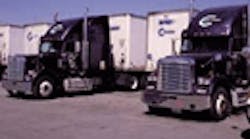The U.S. economic recession is affecting the bottom line of truckload carriers, according to initial earnings reports, though the falloff in diesel fuel prices is softening the blow to some degree.
Steve Russell, chairman & CEO of Celadon Group, said that his company has seen a “significant” drop in freight demand since September of last year. “As a consequence of the fall-off in the U.S. economy, we experienced a significant decline in loaded miles run, as well as an increase in empty miles,” he noted in Celadon’s earnings report for its second fiscal quarter which ended Dec. 31, 2008.
Russell noted that Celadon’s freight revenue, which excludes fuel surcharges, declined 14% to $98.5 million in its second fiscal quarter, compared to $114.5 million in the same quarter during 2007. Net income, however, remained the same at $1.7 million as a result of tighter cost controls and a steep drop in diesel fuel prices, among other efforts, he said.
The U.S. economic recession is affecting the bottom line of truckload carriers, according to initial earnings reports, though the falloff in diesel fuel prices is softening the blow to some degree.
Steve Russell, chairman & CEO of Celadon Group, said that his company has seen a “significant” drop in freight demand since September of last year. “As a consequence of the fall-off in the U.S. economy, we experienced a significant decline in loaded miles run, as well as an increase in empty miles,” he noted in Celadon’s earnings report for its second fiscal quarter which ended Dec. 31, 2008.
Russell noted that Celadon’s freight revenue, which excludes fuel surcharges, declined 14% to $98.5 million in its second fiscal quarter, compared to $114.5 million in the same quarter during 2007. Net income, however, remained the same at $1.7 million as a result of tighter cost controls and a steep drop in diesel fuel prices, among other efforts, he said.
“We were able to offset the adverse impact of these changes through effective cost management,” Russell said. “A major improvement in miles per gallon has been achieved through lowering tractor speeds, improved tractor aerodynamics, added auxiliary heaters, implementation of a strict tractor idling policy, renegotiation of bulk fuel purchasing arrangements, and counseling of our drivers in more efficient driving patterns. Further, we have benefited by a decline in diesel prices.”
Forward Air Corp., a specialized truckload carrier providing air express freight service, noted that severely worsening economic conditions encountered during the second half of the fourth quarter last year cut its profit expectations almost in half, reducing projected earnings to between 27 and 29 cents per share, compared to previous estimates of 40 to 44 cents per share.
“The earnings shortfall was primarily driven by a further, significant deterioration in airport-to-airport tonnage over the course of the quarter,” said Bruce Campbell, the company’s chairman, president & CEO in a corporate earnings update. “Like most others in the industry, we reported during our third quarter earnings call that tonnage had begun to decrease midway through the third quarter. This tonnage decline intensified throughout the fourth quarter, with December’s tonnage decline being by far the largest.”
By the end of the fourth quarter last year, Campbell said Forward Air’s tonnage declined 14% compared to the same period in 2007.
Celadon’s Russell also noted that the falloff in freight volumes is currently exceeding any reductions in TL industry capacity as well. “Although we have seen a significant reduction in capacity in the truckload industry, through fleet failures and the lack of new Class 8 tractors being built, demand has declined at a greater rate,” he said.



